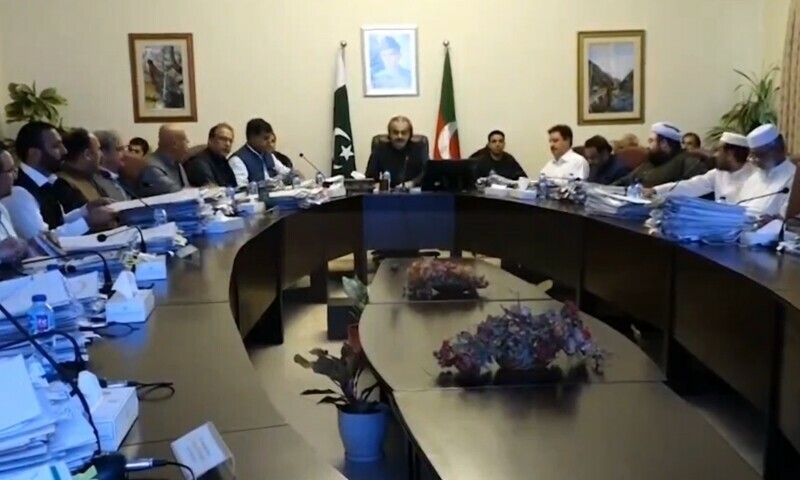PESHAWAR: The Khyber Pakhtunkhwa (KP) government has created a new record by appointing 12 special assistants. This expansion has increased the cabinet size to 33 members, placing a heavy financial burden on the provincial treasury.
The move has ignited controversy due to its potential conflict with the 18th Amendment of the Constitution. Legal experts argue that these appointments violate the spirit of the amendment, raising serious constitutional concerns.
Led by Chief Minister Ali Amin Gandapur, the Pakistan Tehreek-e-Insaf (PTI)-run KP government now has 15 ministers, five advisers, and 12 special assistants. According to Article 130(6) of the 18th Amendment, the size of federal and provincial cabinets cannot exceed 11% of the total assembly members. Additionally, chief ministers and the prime minister cannot appoint more than five advisers.
The cabinet’s size in KP has reached 23% of the total assembly members, a stark contrast to Punjab’s 5.6% and Sindh’s 20%. This issue has sparked heated debates in political and legal circles.
Provincial Cabinet Comparisons
KP leads in appointing special assistants, with 12 in total. Sindh follows with 10, Punjab with three, and Balochistan has none.
- Punjab: With 371 assembly members, Punjab’s cabinet, led by Chief Minister Maryam Nawaz, has 16 ministers, one senior minister, and three special assistants, making 21 members.
- Sindh: With 168 assembly members, Sindh’s cabinet under Chief Minister Murad Ali Shah has 18 ministers, five advisers, and 10 special assistants, totaling 34 members. The chief minister has also appointed eight spokespersons.
- Balochistan: With 65 assembly members, Balochistan’s cabinet, led by Chief Minister Sarfraz Bugti, has 13 ministers and four advisers, totaling 18 members.
Legal Implications
The KP Advisers and Special Assistants to the Chief Minister Amendment Act, 1989, allows the governor to appoint special assistants on the chief minister’s advice. These special assistants work at the chief minister’s discretion and receive remuneration determined by him.
Each minister, adviser, and special assistant earns Rs220,000 monthly, with an additional Rs200,000 for house rent. This places a considerable financial strain on the province.
Legal experts, including Shumail Butt, a former advocate general, criticized these appointments as unconstitutional. He stated that limits on cabinet sizes were intended to reduce government expenses, but alternative practices have bypassed these restrictions. He also pointed out that provincial governments have created their own legislation for appointing special assistants, undermining the Constitution.
Ali Gohar, another legal expert, questioned the participation of special assistants in cabinet meetings. He argued that appointing special assistants exploits legal loopholes and violates the intent of the 18th Amendment. The purpose of limiting cabinet sizes was to reduce government expenses, but this objective has been ignored.
Government Justifications
Defending the appointments, Muhammad Saif, Adviser to the Chief Minister on Information, said the expanded cabinet was necessary to address the province’s unique administrative challenges. He emphasized that special assistants were appointed to manage key portfolios and improve service delivery.
Saif added that while special assistants are not full cabinet members, they exercise ministerial powers and attend cabinet meetings by invitation. He argued that the chief minister has the authority to appoint as many special assistants as required.
KP Cabinet Members
The cabinet includes the following individuals:
- Ministers: Arshad Ayub Khan, Fazal Hakim Khan, Muhammad Adnan Qadri, Aqib Ullah Khan, Muhammad Sajjad, Meena Khan, Fazal Shakoor, Nazir Ahmad Abbasi, Pakhtoon Yar Khan, Aftab Alam Khan Afridi, Khaleeq Ur Rehman, Faisal Khan Tarakai, Muhammad Zahir Shah, Syed Qasim Ali Shah, and Syed Fakhar Jehan.
- Advisers: Muzammil Aslam, Muhammad Ali Saif, Zahid Chanzeb, Ihtesham Ali, and Brig (retd) Muhammad Musaddiq Abbasi.
- Special Assistants: Abdul Karim Khan, Liaqat Ali Khan, Amjad Ali, Muhammad Sohail Afridi, Musavir Khan, Nek Muhammad Khan, Humayun Khan, Tufail Anjum, Rangez Ahmad, Tariq Mahmood Khan Saddozai, Shafqat Ayaz, and Muhammad Israr.
The controversy surrounding the KP cabinet’s expansion continues to raise questions about constitutional compliance and its financial impact.


